Every morning, before the sun has fully risen over Belgaum, you’ll find Shabana weaving her way through the bustling Gandhi Nagar wholesale market. She knows exactly where to stop, which vendor has the freshest tomatoes, and who’s offering the best deal on leafy greens that day. With a cloth bag tucked under her arm and a sharp eye on the weighing scales, this 31-year-old woman entrepreneur is on a mission to keep her small vegetable business running strong.
But until recently, getting there wasn’t easy. Shabana often walked long distances or squeezed into crowded buses, lugging heavy sacks of vegetables in scorching heat or pouring monsoon rains.
“Kabhi lagta tha bas, sabzi ka bojh mujhe gira dega,” she recalls.
Still, she pushed on, because this vegetable business is her lifeline.
By 9 a.m., Shabana is outside Rahat Hotel in Khade Bazaar, Near Central Bus Stand, which is a busy landmark in the city, arranging baskets of vegetables in neat rows. She doesn’t own a permanent shop. Instead, she rents a tiny patch of space in front of the hotel to set up her stall.
“Yeh dukaan nahi hai, par meri rozi-roti yahin se chalti hai,” she says with quiet pride.
For the last five years, this stall has fed her family and helped her stand tall as an independent woman entrepreneur in India. She once worried about putting food on the table. Now, she brings fresh food to every table.
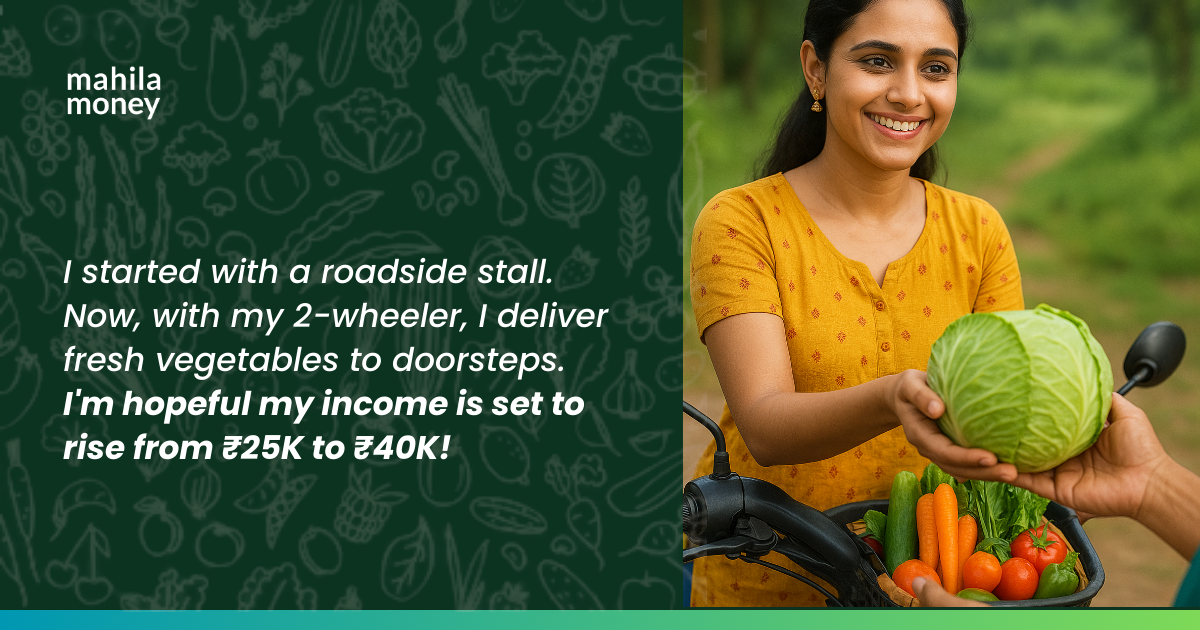
Struggles of Running a Roadside Vegetable Stall
Shabana lives in a rented house with her mother and young son. She is a single mother who has shouldered the responsibility of running the household.
“Main akeli ho gayi thi, lekin maine himmat nahi haari,” she says.
Her mother helps her at the stall, while her son studies in a hostel nearby. Every Monday, the market’s holiday, she visits him, bringing little treats from home.
Running a roadside vegetable business is backbreaking. Vegetables are perishable, competition is fierce, and profit depends on speed.
“Sabzi jaldi bikni chahiye, warna nuksaan hota hai,” she explains.
Rising at dawn, hauling sacks, and working from 8 a.m. to 8 p.m. takes stamina. Some days she carries her own lunch from home, other days she grabs a quick meal at Rahat Hotel. And when the day slows down, she hums along to her favourite Hindi and Kannada film songs, her small escape in a long, hectic routine.
This single mother entrepreneur story reflects the realities of many women who fight for survival while building a future for their children.
The Turning Point: A Loan to Grow Her Vegetable Business
For years, customers asked if she could deliver vegetables to their homes. Shabana wanted to, but how? Carrying large loads on foot wasn’t possible. That’s when she approached Mahila Money for help.
With support from ElectricPe, she availed an EV loan for business of ₹42,646. She made a down payment of ₹21,000 herself, a sign of her commitment.
“Pehli baar laga ki ab business aur aage badh sakta hai,” she smiles.
Her new Li-Xypro electric two-wheeler has been a game-changer. Now she rides the 4–6 km between home and stall with ease, carries more vegetables from the wholesale market, and most importantly, runs her own vegetable delivery business.
“Ab main taiyaar hoon, har ghar tak tazi sabzi pahunchane ke liye,” she beams.
How the EV Boosted Her Vegetable Business
The impact was immediate. With her two-wheeler, Shabana can:
- Offer home delivery of vegetables, a unique edge in a saturated market.
- Carry a wider selection of stock from wholesale markets, giving customers a greater choice.
- Save commute time, which she now uses to improve her stall setup.
- Reduce wastage by keeping vegetables fresher with faster delivery.
Customers in her neighbourhood now call her directly for their daily groceries.
“Pehle log bolte the, ghar tak kaise milegi sabzi? Ab main kehti hoon, bas phone karo,” she laughs.
Her monthly income, earlier capped at ₹20,000–25,000, has already begun climbing. With the EV and her vegetable on wheels model, she expects her vegetable business to bring in ₹40,000–45,000 every month consistently.
Future Plans: From Roadside Stall to Permanent Shop
For Shabana, this is just the beginning. Her dream is to own a proper shop in Belgaum.
“Sadak pe dukaan lagana mushkil hota hai. Kabhi police aa jaati hai, kabhi jagah ka problem hota hai,” she explains.
A permanent shop would bring her stability, dignity, and the chance to expand. Until then, she is focused on taking more orders, building a loyal customer base, and making her small business in Belgaum stronger with each delivery.
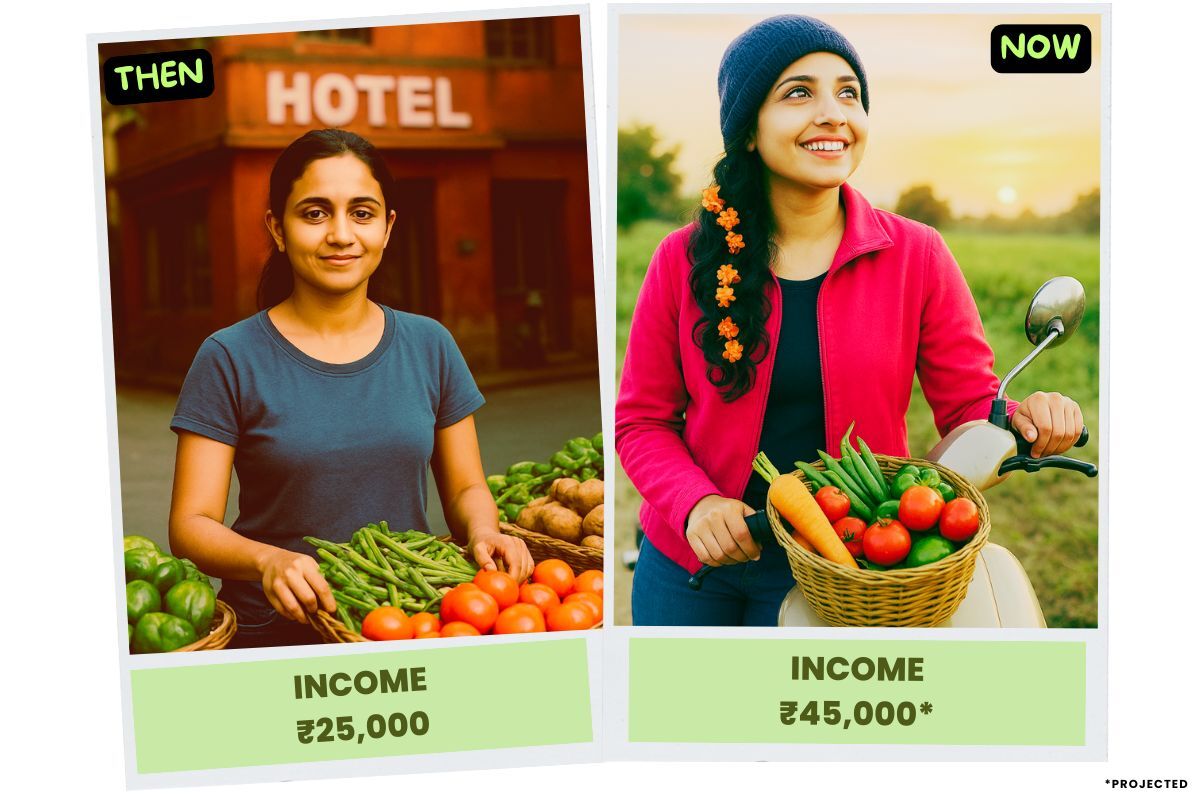
Supporting Women Entrepreneurs in Small Businesses
Shabana’s journey shows how credit access can empower women entrepreneurs in India. Mahila Money understood her needs, evaluated her repayment ability, and gave her the confidence to invest in an asset that boosted her small business story.
For her, it’s not just about the loan.
“Loan sirf paisa nahi hota,” she reflects. “Yeh ek mauka hai, apne sapne sach karne ka.”
And while she works long days to grow her vegetable business, she never forgets the small joys, singing along to old film songs, sharing laughter with her mother at the stall, and saving every Monday for her son. These little things remind her why she started, and why she’ll keep going.
Final Word
From struggling with bus rides in the rain to delivering fresh vegetables at doorsteps on her two-wheeler, Shabana’s story is proof that determination, when supported with the right opportunities, can turn a roadside stall into a thriving vegetable delivery business.
Her vegetable business is not just her livelihood, it’s her independence, her resilience, and her way of moving forward.
Thinking About How to Start a Vegetable Business?
Shabana’s journey is an inspiring small business story for anyone wondering how to start a vegetable business. It shows that with determination, community support, and access to credit like an EV loan for business, even a roadside stall can grow into a profitable, modern vegetable delivery business.
If you’re a woman dreaming of starting your own venture, let this story be your guide: start small, stay consistent, and never stop believing in growth.
Frequently Asked Questions (FAQs)
1. How do I start an organic vegetable business in India?
For starting a vegetable business begin with sourcing fresh stock from trusted organic farmers, get basic licenses (like FSSAI), and sell via shop, stall, or online delivery. Women entrepreneurs can expand their operations to include home delivery of vegetables, a move that helps them stay competitive.
2. Is selling vegetables a profitable business?
Yes, a vegetable selling business can be profitable. Organic veggies earn higher margins. Many small sellers make ₹30K–₹60K monthly.
3. Do I need a shop to start a vegetable business?
Not always. You can start with a vegetable business with home deliveries, weekly veggie baskets, or tie-ups with organic stores.
4. Can I get a loan for my small business?
Yes, women entrepreneurs can avail loans for their small businesses through platforms like Mahila Money. These loans are designed for micro and small entrepreneurs, whether you run a vegetable business, a tailoring shop, or a food cart.
5. Is a food cart loan available in India?
Yes. Several financial institutions and lending platforms provide food cart loans or small-ticket loans for street vendors and micro-entrepreneurs. These loans can be used to buy a pushcart, stock inventory, or even upgrade to an electric vehicle for deliveries.
6. Can I use a business loan to buy an electric vehicle?
Absolutely. Just like Shabana, entrepreneurs can use loans to buy electric two-wheelers or small EV carts. These vehicles help expand reach, save time, and reduce operating costs, especially for businesses dealing in perishable goods like vegetables.
7. What documents are required to apply for a small business loan?
Basic KYC documents (Aadhar, PAN), proof of business activity (like stall rent receipts, invoices, or bank statements), and income details are usually sufficient. Some lenders also require your bank account to be linked with Aadhaar for easy processing.
8. How much investment is required to start an organic vegetable business?
Small setups can start with ₹50K–₹1L. A full shop or online business may need ₹5–10L.
Apply For a Business Loan
Read more success stories:
How a Teacher Turned Fashion Entrepreneur Grew Her Small Business with Mahila Money
How a Single Mother Entrepreneur Found Her Calling as Dr. Mital, the Skin Doctor
How Tehseen Built Three Businesses with Small Business Loans for Women Entrepreneurs
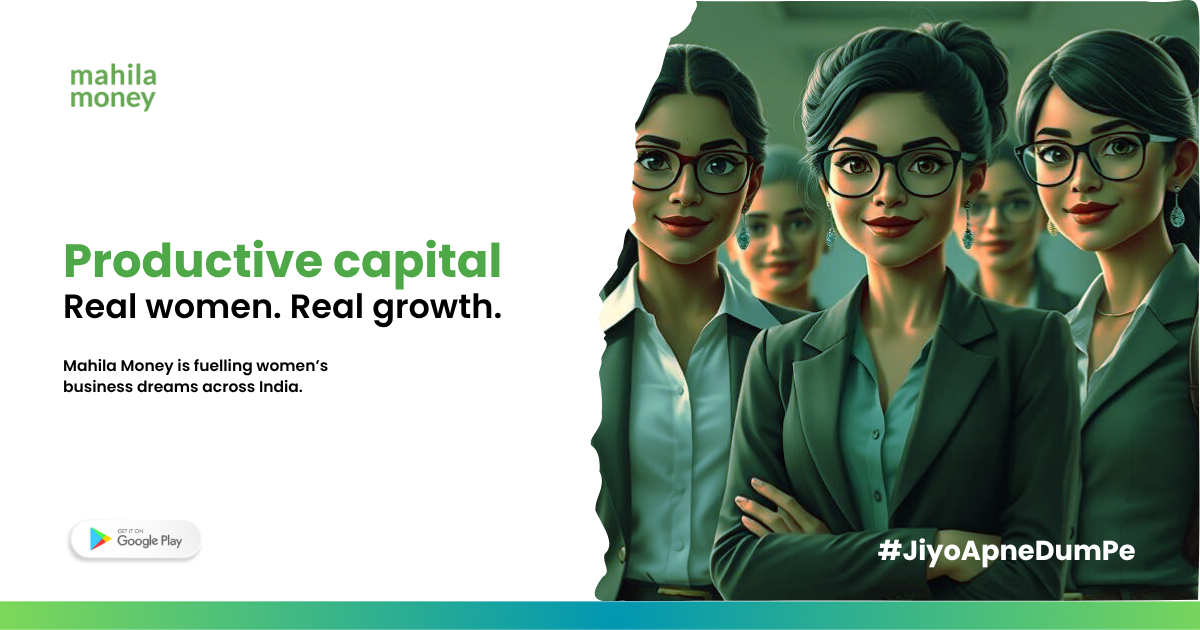
If you are a woman entrepreneur who wants to take your business to new heights and is in need of working capital and entrepreneurship resources, come speak to us on Mahila Money. For more such #JiyoApneDumPe live conversations, download the Mahila Money App on Play Store or visit us on www.mahila.money

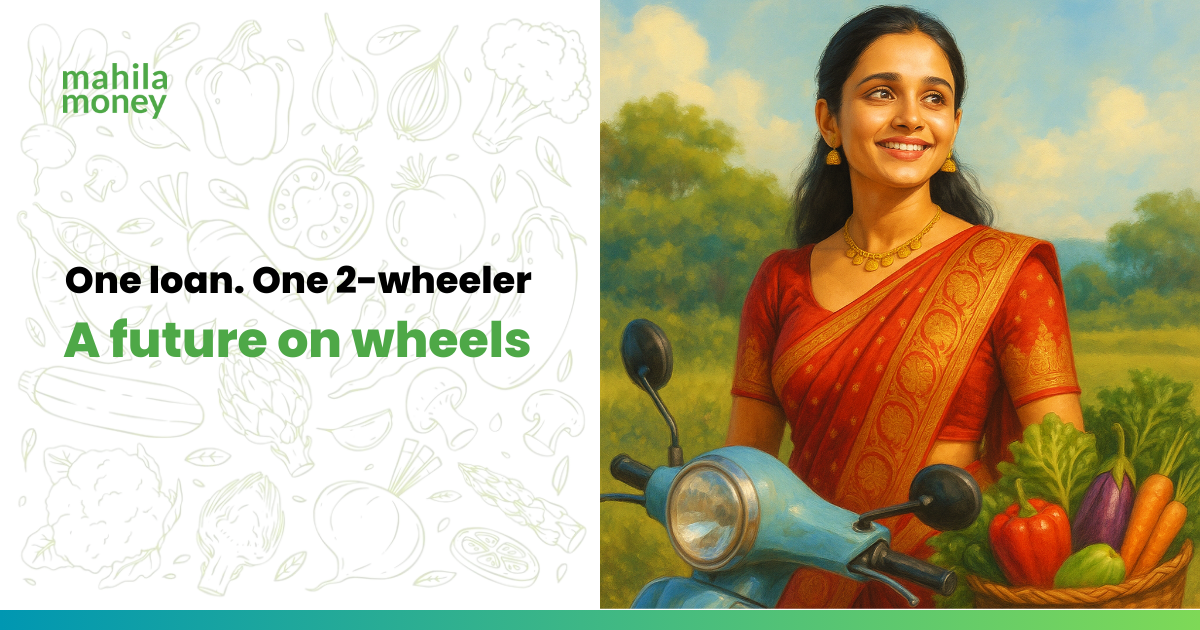


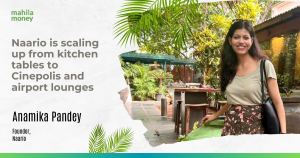
Shabana ki journey sach mein inspiring hai! 🥦
Shabana’s story of doubling her income with an EV loan is truly inspiring. I’m impressed by how she navigates Belgaum’s bustling markets and provides home delivery.